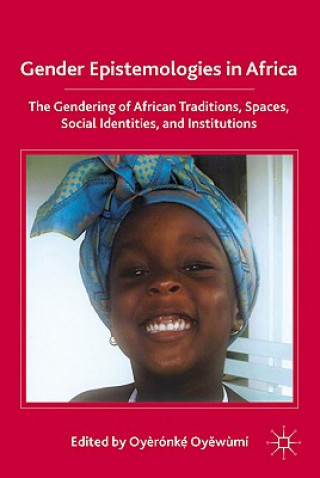
Doručení
Nákupní rádce





Nehodí se? Vůbec nevadí! U nás můžete do 30 dní vrátit
 Dárkový poukaz
V libovolné hodnotě
Dárkový poukaz
V libovolné hodnotě
S dárkovým poukazem nešlápnete vedle. Obdarovaný si za dárkový poukaz může vybrat cokoliv z naší nabídky.
Gender Epistemologies in Africa
 Angličtina
Angličtina
 290 b
290 b
30 dní na vrácení zboží
Mohlo by vás také zajímat


This volume will bring together a variety of studies that are engaged with notions of gender in different African localities, institutions and historical time periods. The objective is to expand empirical and theoretical studies that take seriously the idea that in order to understand gender and gender relations in Africa, we must start with Africa. The paucity of studies of gender in Africa and the over representation of Western societies in the literature necessitate putting together a collection such as this one. If gender emerges out of particular histories and social contexts, we must therefore pay attention to the histories of genderings as well as the continuous ways in which gender is made and remade in everyday interactions, and by institutions. In this sense then, "gender" is actually more about gendering - a process - rather than something inherent in social relations. The papers in this anthology span a wide range of societies, cultures, historical time periods and disciplines. Most of the papers are products of original research that have not been published elsewhere. A number of them are pioneering in that they are interrogating gender in subjects and institutional sites that have in he past not invited much gender analysis in African studies: notably Amoo-Adare's paper on gender and the construction of urban space, and David Ogungbile's consideration of women's leadership role in Islam. The focus on elite African women in a number of the papers is also a welcome corrective to the overwhelming focus on African poverty and victimhood of women. The overrepresentation of African women in much of the literature as desperate victims robs them of agency, which in turn often lead to a devaluation of African experiences of resistance, and nullifies African females as a resource for developing feminist ideas and theories. A focus on elite women also sharpens our engagement with gender issues as we explore the intersection of class and ethnic privilege in relation to gender disadvantage. Some of the questions the papers in the collection ask are: What do histories, traditions, uses of space, cultural productions and institutions tell us about notions of gender in particular times and places? What meanings do men and women attach to their own everyday social practices, institutions, as well as cultural productions? What are the implications of these for our understanding of gender as a social category, as a facet of identity, and even the process of gendering itself? What do they tell us about the lived experiences of males and females in these societies?
Informace o knize
 Angličtina
Angličtina
Kategorie




 Jak nakupovat
Jak nakupovat



























